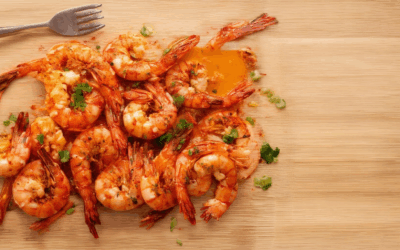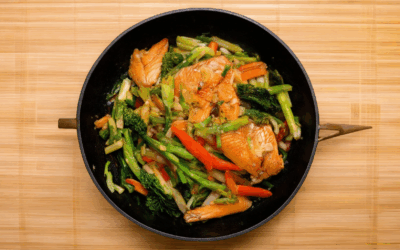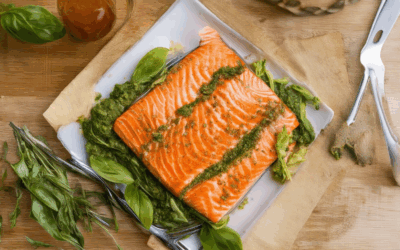Shrimp in lemon butter sauce is a culinary delight that combines the delicate flavor of shrimp with the zesty tanginess of lemon butter, creating a dish that’s as delicious as it is easy to prepare. Whether you’re a seafood enthusiast or a home cooking novice, mastering the art of preparing shrimp in lemon butter sauce can elevate your meals to new heights. This recipe not only offers a simple yet elegant solution for a quick dinner but also provides versatile options for customization, allowing you to experiment with different ingredients and cooking methods. From classic shrimp in lemon butter pasta to magical baked shrimp in lemon butter, this guide will walk you through every step, ensuring a flavorful and satisfying experience. Discover the secrets to achieving the perfect balance of tangy and savory, and learn how to pair your shrimp with everything from garlic and herbs to creamy sauces and white wine. With this comprehensive approach, you’ll be able to create dishes that impress family and friends alike.
Key Takeaways
– Master the Art of Lemon Butter Sauce: Craft a flavorful, balanced sauce using fresh lemon juice, rich butter, and aromatic herbs for a tangy, creamy experience.
– Simple Yet Delicious Recipe: Create a versatile shrimp dish with ease, thanks to a straightforward step-by-step guide tailored for perfection.
– Versatile Sauce for All Dishes: Elevate your meals with lemon butter sauce, perfect for shrimp, pasta, veggies, or grilled meats.
– Customizable Flavors: Enhance your dish with optional additions like sugar or honey for a sweeter twist or capers for a briny kick.
– Gluten-Free Friendly: Use arrowroot or tapioca starch for a thickened sauce that suits all dietary preferences.
– Pro Tips for Thinner Sauce: Achieve the ideal consistency with a roux-based method, ensuring a smooth and flavorful result every time.
– Fresh Herbs for Extra Zest: Garnish with parsley or chives for a vibrant finish, enhancing both taste and presentation.

What Does Lemon Do to Shrimp?
Lemon juice has a unique interaction with shrimp, acting as both a flavor enhancer and a natural cooking agent. When applied to shrimp, the acidity in lemon juice denatures the proteins in the crustacean’s flesh, altering their molecular structure. This process softens the shrimp and imparts a fresh, tangy flavor.
- Flavor Enhancement: Lemon juice adds brightness and acidity, complementing the natural sweetness of shrimp. It’s particularly effective in marinades and dressings.
- Tenderization: The acidic properties of lemon juice can help break down muscle fibers, making the shrimp more tender and easier to digest.
- Cooking Facilitation: While not a substitute for heat, lemon juice can partially cook shrimp through denaturation, especially in cold applications like ceviche.
For a delicious dish, try marinating shrimp in lemon juice with herbs and spices before grilling or sautéing. This method ensures a flavorful and tender result, perfect for appetizers or main courses.
Looking for more shrimp recipe ideas? Explore our shrimp recipes collection for inspiration!
How Long Should You Leave Shrimp in Lemon Juice?
If you’re using pre-cooked shrimp, you don’t need to soak them in lemon and lime juice for 15 minutes. Just about 5 minutes will suffice. However, if you’re working with raw shrimp, you should plan on soaking them for approximately 15 minutes. This allows the acidity of the lemon and lime juice to gently cook the shrimp, ensuring they’re safely prepared.
The cooking time difference lies in the state of the shrimp. Raw shrimp requires the extended soak to reach a safe internal temperature, while pre-cooked shrimp is already ready to eat and only needs a brief marinating period to enhance its flavor.
- Pre-cooked shrimp: 5 minutes
- Raw shrimp: 15 minutes
For optimal flavor, make sure to chop your onions well before incorporating them into your dish. This ensures a smooth texture and even distribution of flavor throughout the dish.

Are Shrimp and Lemon Good Together?
Shrimp and lemon are a fantastic culinary combination, offering a balance of bright acidity and delicate brine that enhances both textures and flavors. Here’s why they work so well together:
- Acidity and Flavor Enhancement : Lemon juice adds a refreshing tanginess to shrimp, complementing their natural sweetness and preventing them from tasting bland. The acid also helps dissolve proteins in the shrimp, making them more tender.
- Marinades and Sauces : Lemon is a versatile base for marinades and sauces. A simple lemon garlic butter sauce, for example, creates a rich, flavorful coating that clings to the shrimp, leaving them moist and flavorful.
- Health Benefits : Both shrimp and lemon are nutritious choices. Shrimp is low in calories and high in protein, while lemon is packed with vitamin C and antioxidants. This combination supports a balanced diet.
- Versatility in Cooking : Shrimp can be prepared in countless ways, and lemon adapts to nearly every technique. Whether you’re grilling, baking, or sautéing, lemon adds a finishing touch that elevates the dish.
For a quick and delicious meal, try our Lemon Garlic Butter Shrimp Recipe . Pan-sear shrimp in a mixture of butter, garlic, and lemon juice, then finish with fresh parsley for a fresh, zesty dinner. Pair this with a side of our favorite seafood-inspired sides for a complete and satisfying meal.
Don’t limit yourself to just shrimp though—try these citrusy pairings with other seafood varieties too!

What is Lemon Butter Sauce Made Of?
Lemon butter sauce is a versatile and flavorful condiment crafted from a combination of fresh lemon juice, rich butter, and aromatic ingredients. Here’s a breakdown of its key components:
- Lemon Juice: Freshly squeezed lemon juice adds brightness and acidity, balancing the richness of the butter.
- Butter: High-quality unsalted butter provides a creamy texture and rich base for the sauce.
- Shallot: Finely chopped shallots contribute a sweet, mild onion flavor that complements the citrus and buttery notes.
- Garlic: A few cloves of minced garlic add depth and complexity to the sauce.
- Chicken Broth: A splash of chicken broth enhances the sauce’s body and depth, preventing it from being too heavy.
- Parsley: Chopped parsley adds freshness and color, making the dish visually appealing.
- Seasonings: Salt and freshly ground black pepper are essential for seasoning, ensuring the sauce is well-balanced.
- Optional Additions: Some recipes may include a pinch of sugar to round out the acidity, or capers for a briny kick.
Lemon butter sauce is a perfect accompaniment for grilled meats, fish, pasta, and vegetables, offering a delightful balance of tangy and creamy flavors. Experiment with different variations by adjusting ingredient proportions or incorporating herbs like chives or dill for added complexity.
How to Make Easy Lemon Butter
- Ingredients:
- 2 large eggs
- 1/2 cup granulated sugar
- 1/4 cup fresh lemon juice
- 1 teaspoon grated lemon zest
- 2 tablespoons unsalted butter
- Instructions:
- Prepare the Egg and Sugar Mixture: Whisk eggs and sugar in a heatproof bowl until the sugar dissolves completely.
- Add Lemon Components: Pour in lemon juice and lemon zest, stirring continuously to combine.
- Melt the Butter Slowly: Gradually add the butter, one tablespoon at a time, while continuously whisking. This ensures the mixture emulsifies properly without separating.
- Thicken the Butter: Whisk for about 20 minutes until the mixture thickens slightly and coats the spoon evenly.
- Optional Enhancements:
- Add a pinch of salt for extra flavor
- Stir in a tablespoon of honey for a sweeter taste
Note: This method creates a rich, creamy lemon butter that’s perfect for drizzling over grilled fish, steamed vegetables, or warm bread. The slow whisking process ensures a smooth texture, while the lemon zest adds a bright citrus flavor.
For more seafood-inspired recipes, visit our Only Fish Recipes collection.

How to Thicken Lemon Butter Sauce
To achieve the perfect consistency for your lemon butter sauce, follow these simple steps:
- Make a Roux: In a small pan, melt 2 tablespoons of butter over medium heat. Add 1 tablespoon of hot water and whisk in 2 tablespoons of all-purpose flour or 1 tablespoon of cornstarch until smooth.
- Thicken the Sauce:** Pour the roux into the lemon butter sauce and whisk continuously until it reaches your desired thickness. If using cornstarch, mix it with 1 teaspoon of cold water and whisk into the sauce.
- Consider Alternatives:** For a gluten-free option, substitute arrowroot powder or tapioca starch mixed with 1 teaspoon of cold water.
- Adjust Acid Levels:** Be mindful of the lemon juice’s acidity. Reduce the heat if necessary to prevent curdling and adjust the lemon zest for balance.
- Simmer:** Once thickened, simmer gently for a few minutes to cook out any raw flour taste and allow flavors to meld.
Garnish with fresh herbs or crusty bread for an extra touch!




0 Comments